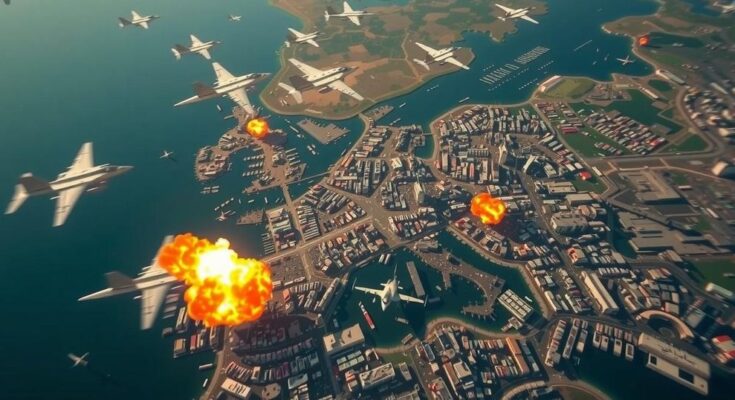Israeli airstrikes in Damascus killed at least 15 and injured 16, targeting Palestinian Islamic Jihad. Concurrently, Israel intensified strikes in southern Lebanon against Hezbollah, claiming to have neutralized numerous militants and rocket launchers. These operations reflect Israel’s strategy to prevent Iranian-backed groups from operating in proximity to its borders.
On Thursday, Israeli fighter jets targeted locations in Damascus, Syria, associated with Palestinian Islamic Jihad, resulted in the deaths of at least 15 individuals and left 16 others injured, including women and children, according to reports from Syrian state media. The strikes, which occurred around 3:20 p.m. local time in the al-Mezzeh neighborhood, inflicted considerable damage to several buildings. The Israeli military stated that the assault significantly impacted a command center for Palestinian Islamic Jihad, a group supported by Iran, and held the Syrian government responsible for permitting its operations. Israeli military operations have not been confined to Syria; they have also included extensive bombardments in southern Lebanon, particularly against Hezbollah, another Iranian-backed militant group. Military officials reported eliminating many Hezbollah fighters and neutralizing over 140 rocket launchers in recent weeks. Israel’s military chief, Herzi Halevi, noted the ongoing nature of these operations: “We are conducting deep strikes and striking frequently in Syria and along the Syria-Lebanon border to prevent weapons transfers to Hezbollah.” This escalation of military action reflects Israel’s long-standing strategy to disrupt Iranian proxy activities in the region. For years, Israel has conducted air strikes in Syria with the aim of thwarting the activities of groups like Palestinian Islamic Jihad and Hezbollah. While the Israeli government typically refrains from commenting on specific strikes, there has been an increase in public acknowledgment by officials of these military operations over the past weeks.
The conflict between Israel and groups such as Palestinian Islamic Jihad and Hezbollah is rooted in longstanding hostilities in the region, exacerbated by the influence of Iran. Israel has consistently expressed concern over the activities of Iranian-backed militias operating in Syria, which it views as a direct threat to its national security. The Israeli military traditionally engages in air strikes aimed at preventing these groups from acquiring or using advanced weaponry, thereby escalating tensions along the borders with both Syria and Lebanon. The ongoing skirmishes illustrate the volatile geopolitical landscape in the Middle East.
The recent Israeli airstrikes in Syria and Lebanon signify a notable escalation in military actions against militant groups aligned with Iran. The casualties reported highlight the severe humanitarian impact of these operations. By targeting Palestinian Islamic Jihad in Syria and Hezbollah in Lebanon, Israel aims to deter weapon transfers and reduce the operational capabilities of these groups. Such strategic military responses underscore the complexities and ongoing tensions in the region.
Original Source: www.nytimes.com




